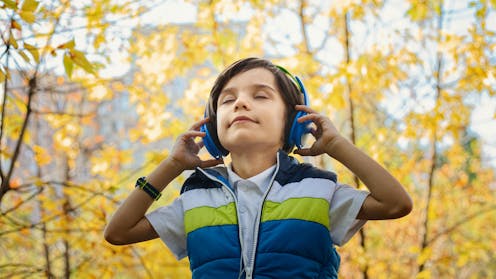We teach kids to look after their bodies - here’s how to do the same for a healthy mind
- Written by The Conversation

Young people today are growing up in an increasingly complex world — and arguably suffering as a result.
Social media and smartphones provide constant distractions, while the rise of AI and misinformation mean nothing online is straightforward.
The pandemic has shown young people the world can be an unpredictable place, the housing crisis makes it hard to make a stable home, while climate change hangs over their future.
It’s no wonder the wellbeing and mental health of young adults has deteriorated across the globe.
Parents and educators teach kids to eat well, stay active, and look after their bodies from when they are little. But what about helping them maintain a healthy mind?
Start early
Prevention is key. Just as early eating habits often carry through to adulthood, we can set the stage for good mental health from birth.
Our brains are more “plastic” early in life, meaning they adapt to the world around them. As a result, childhood experiences shape the mind’s architecture for decades to come.
Stress and trauma can make our brains more vulnerable to poor mental health. But equally, positive early experiences are linked to adulthood wellbeing and cognitive health.
How can we approach mental health prevention for kids? Positive psychology – or the study of wellbeing – offers some clues. Here are three.
1. Prioritise real life relationships
Humans are social creatures and loneliness — which affects many young people — is a key risk factor for poor mental health.
When we connect in-person we “synchronise”. This means people’s behaviour and brains come into harmony, helping them to feel connected and treat each other well.
Interacting online disrupts this synchronisation.
So we need to help young people build good quality relationships in real life.
One of the keys to building good relationships is making time for them. This includes prioritising in-person activities that you enjoy doing together. For example, playing games or sports, taking a walk, or making a meal together.
2. Learn how to overcome challenges
Research also suggests “mastery” is important. This is the sense that we can learn new skills or take on challenges and overcome them. This helps people feel that their actions matter and that they have some control over their world.
Mastery is particularly fulfilling when we tackle something that is intrinsically motivating – where we value the activity in and of itself, not for any extrinsic reward, like winning or wages.
Intrinsic motivation is personal. It could be anything from the joy of playing sport with teammates (even when you lose) to satisfaction experienced in learning the piano.
So it’s important young people have opportunities to pursue things they are genuinely interested in and that challenge them along the way.
3. Create opportunities for positive emotions
All of this ties into a third essential ingredient for human wellbeing: positive emotions.
These range from awe to gratitude, joy and curiosity. They improve both our psychological and physical health.
We can’t positive emotions all the time – life is inevitably up and down. And sometimes sad, bad or unlucky things happen. It’s important that we feel and express these emotions too.
But we can foster a greater balance of positive emotions by deliberately scheduling activities we enjoy and paying attention to how we feel. This does not have to be complicated or expensive. It may involve small things like pausing to appreciate a beautiful butterfly during a walk or noticing the taste of a yummy meal.
It’s like the food pyramid – but for a healthy mind
So, how do we get these ingredients into our children’s lives? Luckily we have a well-known framework to start from: the food pyramid.
The pyramid tells us we need a mix of things. Some of these things we need a lot of. Others things should only be occasional.
In terms of our mental wellbeing, we need a lot of social connection, every day and in large amounts. Social connection is the “vegetables” of a good mind diet, but more enjoyable!
We also need to consume a diverse range of high-quality information. This might include things like learning new skills or subjects at school, which can foster a sense of mastery and positive emotions like curiosity.
And of course, some things are harmful if consumed in excess. Social media, like sugar, should only be consumed occasionally and in small amounts. It may give us a “quick fix” by releasing the brain’s reward chemical, dopamine. But research suggests this may be addictive and lead to long-term harm.
Protect against junk information
In this age of misinformation, there is a lot of junk online. Research suggests misinformation can be harmful for mental health, causing heightened anxiety and stress.
Unfortunately, information doesn’t come with nutrition labels like our food does. But we can teach kids how to identify good quality information they can trust — sources that are fact-checked and reliable. For example, strategies like lateral reading (or searching for other good sources on the same subject) can help with thinking critically about the information we consume.
While we teach these ideas using the healthy “mind diet pyramid” idea, it is equally important adults model healthy information consumption for children — your mind may thank you too.







